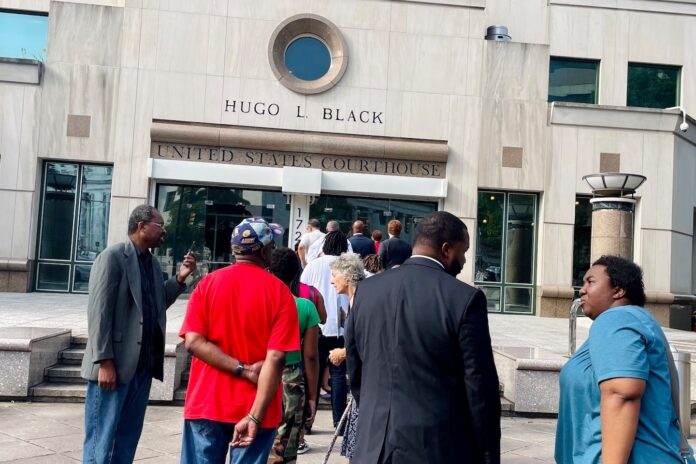The judges — U.S. District Judges Anna M. Manasco and Terry F. Moorer of Alabama — joined this week with a Clinton nominee, Stanley Marcus of the U.S. Court of Appeals for the 11th Circuit, in a remarkable rebuke of Alabama’s failure to comply with an order to redraw its congressional maps to give Black voters a better chance to elect candidates of their choice.
Of course, there is a less rosy take on this still-unfolding story: Massive resistance to civil rights remains alive and well in Alabama, so much so that even Trump judges felt compelled to slam the state for its recalcitrance in the face of a loss at the Supreme Court.
Both interpretations are accurate. It seems odd to praise the Trump judges for simply doing their jobs and following the law. But given the performance of so many of their colleagues, and given the outrageous response of the Alabama legislature to a judicial order, talking about the glass half-full feels appropriate. In the end, although late, the rule of law will prevail.
To recap: For 115 years, from 1877 to 1992, Alabama had no Black members of Congress. Now, although the state’s population is 27 percent Black, there is just one Black representative in the state’s seven congressional districts, and it took a lawsuit to create that majority-Black district. After the 2020 Census, when the legislature again adopted a map with just one majority-Black district, Black voters filed suit, claiming that the districting violated Section 2 of the Voting Rights Act, which prohibits rules and practices that deny minority voters an equal opportunity to elect candidates of their choice.
The special three-judge court that convened to hear the case agreed, finding that the question of whether the maps likely violated the Voting Rights Act “was not a close one.” Manasco, Moorer and Marcus ordered the legislature to draw a new plan that includes two districts “in which Black voters either comprise a voting-age majority or something quite close to it.”
Alabama appealed to the Supreme Court — and, in the meantime, five conservative justices allowed the 2022 elections to go forward under the existing map found to discriminate against Black voters. But in June, ruling 5-4, the majority surprisingly sided with the lower court, clearly exasperated with what Chief Justice John G. Roberts Jr. termed Alabama’s “attempt to remake our [Section 2] jurisprudence anew.”
If you thought that would be the end of the case, you don’t know Alabama. The state legislature came up with new maps that contained one majority-Black district and another with just 40 percent Black voters — a far cry from what the lower court had ordered. Hence, another slapdown for Alabama.
“We do not take lightly federal intrusion into a process ordinarily reserved for the State Legislature,” the three-judge court wrote in a 196-page ruling that bristled with frustration at the state’s intransigence. “But we have now said twice that this Voting Rights Act case is not close. And we are deeply troubled that the State enacted a map that the State readily admits does not provide the remedy we said federal law requires.”
Noting that Alabama had been given five weeks to draw up a new plan, the court said, “We are disturbed by the evidence that the State delayed remedial proceedings but ultimately did not even nurture the ambition to provide the required remedy. And we are struck by the extraordinary circumstance we face. We are not aware of any other case in which a state legislature — faced with a federal court order declaring that its electoral plan unlawfully dilutes minority votes and requiring a plan that provides an additional opportunity district — responded with a plan that the state concedes does not provide that district.”
Alabama had insisted that the court was obliged to consider the new map for compliance with the law on its own merits — not on the basis of whether it complied with the order to fix the previous, illegal one; also, the state said, if the court then found that the new map failed to comply with the law, it would have to give the state more time to fix it.
Not so, replied the three judges. “In essence, the State creates an endless paradox that only it can break, thereby depriving Plaintiffs of the ability to effectively challenge and the courts of the ability to remedy,” the court said, calling the position “an infinity loop restricted only by the State’s electoral calendar and terminated only by a new census.”
Wow. Good for the judges for calling out this sophistry — and ordering a special master to come up with three alternative maps.
If you’re wondering something about these judges, Moorer is a former federal prosecutor and magistrate who is among the handful of Black judges named by Trump. Manasco is a Yale Law School graduate who clerked for conservative luminary William H. Pryor Jr. on the 11th Circuit. Marcus (no relation) is a former federal prosecutor named to the district by Ronald Reagan and was elevated to the 11th Circuit by Bill Clinton.
Alabama must have known this was coming. Perhaps legislators figured it was better to have the court do the deed of creating a second majority-Black district than to take that step itself; easier to bellyache about intrusive federal judges than do the proper thing themselves.
Or perhaps they imagine they have another shot at the Supreme Court, where they’re already headed for an appeal, potentially peeling off Justice Brett M. Kavanaugh, who provided the fifth vote in June but did not join the majority opinion in its entirety.
But my guess is that the justices are out of patience with Alabama. Thanks to a pair of Trump judges, Black voters in that state might, finally, have a shot at a fair map — and electing a second Black member of Congress — when they go to the polls next November.



